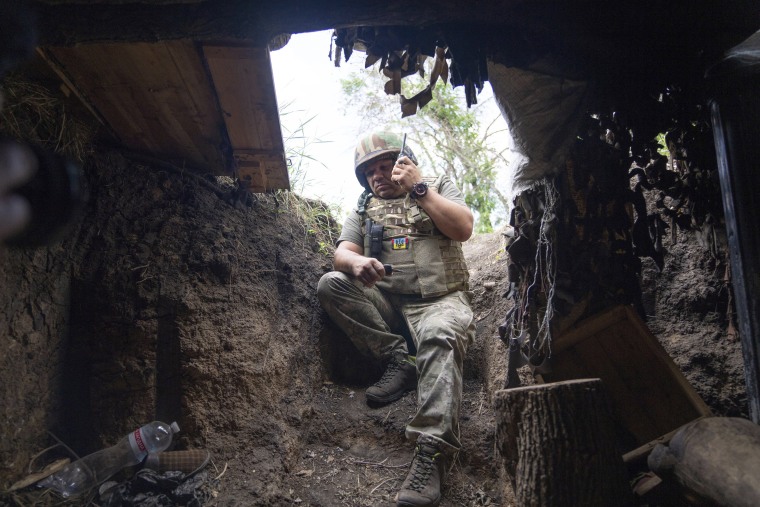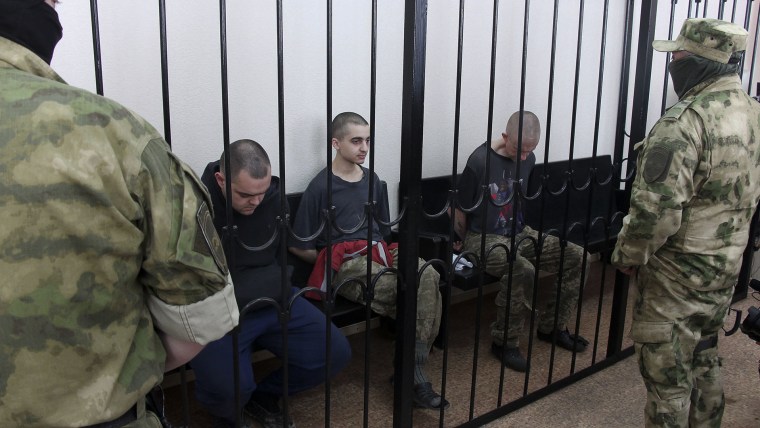Relentless Russian bombings were “the closest thing I’ve ever seen to hell,” an American who served several tours of the Middle East said.
After a thrilling first few months of unexpected success that boosted morale among the Ukrainian ranks, the reality of the bloodiest European conflict since World War II has taken its toll among some of the thousands of foreign fighters who traveled from abroad to battle the Russian invaders.
The war has long moved past the Ukrainian victory in Kyiv’s suburbs, which are still scarred by the mass graves and blown-out buildings of the Russian occupation. Instead, after months of battle, soldiers push for excruciatingly incremental gains from trenches in the grassy plains and farm fields of the country’s east and south.
It’s now a grueling artillery slugfest.

Round after round hits near Ukrainian lines, filling the air with dirt, sand and ash and forcing soldiers to burrow into deep trenches. As Ukrainian troops wait for an opening or calculate the position of a potential target, explosions resonate around them with regular thuds — sometimes for 12 hours at a time. The seeming randomness of the strikes intensifies the feeling among some that survival might come down to sheer luck.
An American fighting for Ukraine who served in the U.S. Army with combat tours in the Middle East described the constant Russian bombardment of the city of Severodonetsk in Ukraine’s Donbas region as “the closest thing I’ve ever seen to hell.”
Ukraine Armed Forces estimate that Russia is using eight times as many artillery munitions each day, firing thousands more shells than the Ukrainians and stymying their efforts.

Another American has been killed in Ukraine, State Dept. confirms
JUNE 21, 202201:44
“We lost three guys,” after fighting near Severodonetsk, the soldier said. “My commander got killed out there. A buddy of mine got killed out there. When s— like that happens, it’s hard to imagine the way forward.”
The Ukrainian losses have been steep: as many as 100 to 200 casualties per day at the worst points in the war, according to Ukraine’s own estimates. These brutal losses have eroded morale within the ranks and in other units, five non-Ukrainian soldiers said in interviews over the past month. Four of the soldiers have not made their identities public and asked that their names not be used out of concern for their security and so they could speak freely about their experiences.
“The number of people that are upset and have low morale has increased, and that’s partly because of the way the Russians have chosen to fight,” Ripley Rawlings, a retired U.S. Marine Corps lieutenant colonel and author, who is providing supplies to foreign fighters in Ukraine through his U.S.-based organization, Ripley’s Heroes, said.
Rawlings, who traveled to Ukraine recently and is sending everything from scopes and goggles to trucks and e-bikes to the troops there, said that “about half of the units that we support have taken terrible hits lately.”

Donetsk rebels sentence captured foreign fighters to death
JUNE 9, 202201:39
Despite the challenges, fighters who spoke to NBC News remained adamant about their commitment to pushing out the Kremlin’s forces. The soldiers admitted, however, that supply shortages, delays in receiving weapons promised by the West, and communication frustrations have challenged their spirits after months of battle.
Other common complaints included that counter-offensive strategies were undermined by older Ukrainian commanders sticking to Soviet tactics. They also noted poor communication among groups, with one soldier highlighting the lack of “a centralized unit that has everybody by the tail and knowing where people are.”
The Kremlin alleges that there are no longer any foreign fighters in Ukraine and that any who remain are mercenaries. Ukraine’s International Legion, meanwhile, said that its soldiers must follow the same disciplinary rules as other Ukrainian soldiers. They are also paid at the same rate: around $500 per month, depending on rank, with the opportunity for bonuses.
Thus they are owed the same treatment as any Ukrainian soldier if captured, said Damien Magrou, the legion’s spokesperson.
Magrou, a Dutch lawyer and a corporal in the legion, said at a news conference this month that Russian disinformation has negatively affected the group’s recruitment, reputation and fundraising, and he told NBC News on Wednesday that because of recent challenges they “are exploring avenues to widen our recruitment.”
As of now, legion members are required to have live combat experience and must pass background checks and a psychological exam to join. Citing security concerns, Magrou declined to say how many soldiers were in the legion or the number of casualties.
“There’s been a gradual dip in the number of arrivals over the course of the last few months, which isn’t very surprising given that attention in Western media has shifted elsewhere and the more motivated fighters made their decision in the beginning,” Magrou said over WhatsApp.
Magrou has said previously that more than 50 nationalities from every continent are represented in the legion and that former soldiers from the U.S. and U.K. are the most common. The Transatlantic Dialogue Center, a Kyiv-based think tank, estimated that more than 20,000 people have joined the International Legion, though it is unclear how they arrived at that figure.




